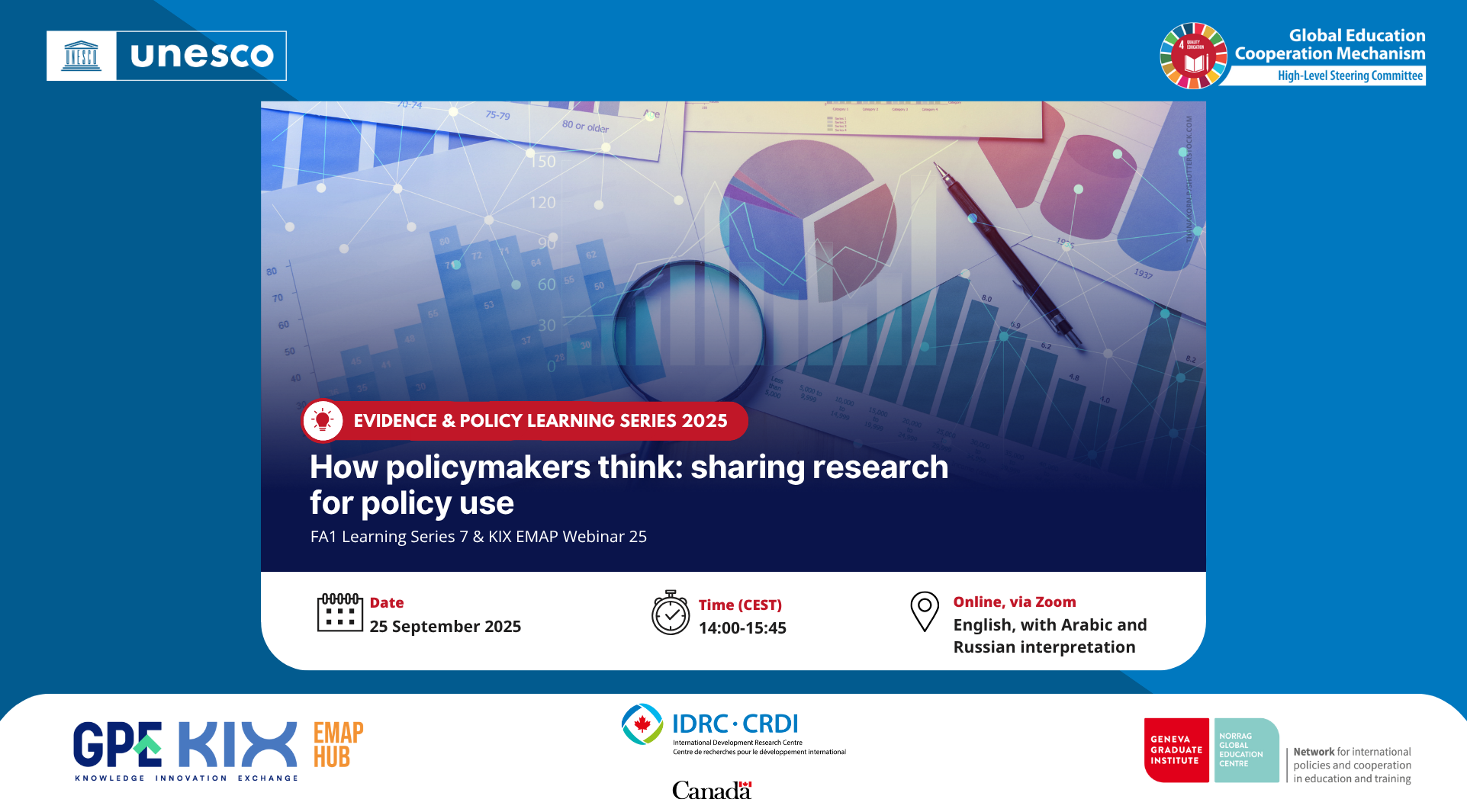FA1 Learning Series 7 & KIX EMAP Webinar 25: How Policymakers Think: Sharing Research for Policy Use
Date: 25 September 2025
Time: 14:00-15:45 (Geneva / CEST)
Location: Online, via Zoom
Languages: English, with simultaneous Arabic and Russian interpretation
KIX EMAP Webinar 25, co-organised with UNESCO, will be the seventh session of UNESCO’s Functional Area 1 (FA1) Learning Series 2025. Learning Series webinars are designed to share critical reflections and local experiences towards building a culture of evidence-based policy and planning.
The Global Partnership for Education’s Knowledge and Innovation Exchange (GPE KIX) project, a joint endeavour with the International Development Research Centre, Canada, was launched in 2020 to support the uptake of research evidence in policy and planning in GPE partner countries. NORRAG hosts the KIX hub for the Europe, Middle East and North Africa, Asia and Pacific (EMAP) region, which is committed to surface, amplify and disseminate local policy expertise. Both NORRAG and the KIX EMAP Hub see the lack of involvement of local policy expertise at the production phase as one of the main reasons why uptake is hampered once reports and studies have been published.
Five years later, the question becomes: what have Ministries of Education and their partner institutions undertaken to establish and mainstream the production and use of research evidence in policy and planning decisions?
There is much to learn from Ministries of Education both inside and outside the KIX EMAP region about the creation and sustainability of a culture of evidence-based policy and planning in government offices. There is also much to learn from the experience of partner institutions in contributing data and research evidence to policy discussions in countries of the EMAP region and beyond. This webinar will explore these strategies through two panel discussions, followed by questions and answers from the audience.
The first panel will feature government officials from Ministries of Education who stand out for their commitment to enhancing the use of research evidence in policy and planning decisions. They have established linkages with research institutions, commissioned studies, or hired staff with technical expertise, to name a few of the strategies used to propel evidence-based planning and policymaking. The panellists will reflect on when, why, and how data-informed advice received from researchers and policy analysts was most useful.
The second panel will feature researchers based at research institutions, think tanks, and government-affiliated institutions that draw on data and research evidence to advise their government on school reform. The panellists will reflect on the conditions that need to be met to make the collaboration fruitful and to make their advice heard.
Agenda
| Welcome and Introductory Remarks | ||
| Framing Presentation | Gita Steiner-Khamsi | |
| Roundtable 1: Knowledge Users
Moderator: Gita Steiner-Khamsi |
Elaine Munthe Irsyad Zamjani Lim Sothea Lira Samykbaeva |
|
| Q&A Session | ||
| Roundtable 2: Knowledge Producers
Moderator: Chanwoong Baek |
Sajid Ali Sung Jae Park Syeed Ahamed Thi Ly Le |
|
| Q&A Session | ||
| UNESCO FA1 Presentation and Closing Remarks | Gwang-Chol Chang |
Speakers
 Chanwoong Baek
Chanwoong Baek
Chanwoong Baek is an Assistant Professor in the International Relations/Political Science Department at the Geneva Graduate Institute. He is also UNESCO Co-Chair in Comparative Education Policy and Academic Director of NORRAG. His research critically assesses the claims of “evidence-based” policymaking from a comparative and international perspective, employing both quantitative and qualitative methods. His work on evidence, data, and knowledge has been published in Policy Studies, British Journal of Sociology of Education, Compare, and Journal of Education Policy. He completed his PhD in Comparative and International Education with a specialization in Sociology at Columbia University and his MA in International Comparative Education at Stanford University.

Elaine Munthe
Elaine Munthe is Professor of Education at the Knowledge Center for Education, University of Stavanger (UiS), Norway. She has been the Department Chair for teacher education (UiS), Dean of the Faculty of Arts and Education (UiS), and from 2019-2024 she built the Knowledge Center for Education (KCE) at UiS. KCE is funded by the Ministry of Education and Research to conduct systematic reviews of research for the education sector and to make systematic reviews accessible. A main goal is to enhance the use of high quality research. Munthe has been strongly involved in the development of research programs for educational research in Norway and chaired the ‘Research and Innovation in Education’ program for the Norwegian Research Council. She has served on research panels in Sweden, Finland, and Singapore, and was awarded the 4th Dr. Ruth Wong professorship at the National Institute of Education, Nanyang University, Singapore.
 Gita Steiner-Khamsi
Gita Steiner-Khamsi
Professor Gita Steiner-Khamsi is the KIX EMAP Hub Lead Researcher. She was NORRAG’s Academic Director from 2017 to 2022, having significantly expanded the research capacity and outreach of the NORRAG Global Education Centre of the Geneva Graduate Institute. She is the William H. Kilpatrick Professor of Comparative Education at Teachers College, Columbia University, New York. She holds a secondary honorary appointment as the UNESCO Chair of Comparative Education Policy at the Geneva Graduate Institute, Switzerland. A past president of the Comparative and International Education Society (CIES) and a past co-editor of the World Yearbook of Education, she has actively advanced the transnational dimension of policy research. She published sixteen books and numerous journal articles related to global governance, policy transfer, and international cooperation.
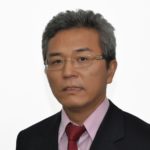 Gwang-Chol Chang
Gwang-Chol Chang
Dr Gwang-Chol Chang is currently the Chief of Education Policy Section at UNESCO Headquarters since June 2019. Before that, he worked as Senior Program Specialist, Chief of Education Section at the UNESCO Regional Office in Dakar since February 2016 and coordinated all education programs of the Office. Prior to joining Dakar Office, he was Senior Program Specialist at UNESCO. From 1996 to 2010, he served at various units of UNESCO’s Education Sector in Paris, supporting diverse programs, including policy analysis, planning, and management. Before 1996, he worked at the Ministry of Education of his country. He holds a Doctorate in Education (Ed.D) from Kim Hyong Jik University of Education, DPR Korea
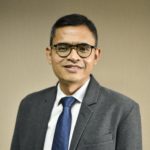
Irsyad Zamjani
Irsyad Zamjani is the Head of the Center for Education Standards and Policy, the Ministry of Primary and Secondary Education, Indonesia. He earned his PhD in Sociology from the Australian National University (ANU), Canberra. His scholarly work includes the book The Politics of Educational Decentralization in Indonesia: A Quest for Legitimacy (Palgrave Macmillan, 2022), which explores the intersections of power, social change, and institutional reform in shaping the nation’s education landscape.
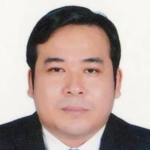 Lim Sothea
Lim Sothea
HE Dr Lim Sothea is currently Director General of Policy and Planning; Ministry of Education, Youth and Sports; Kingdom of Cambodia, where he has worked for more than 20 years as education policy maker and planner. In his role, he plays a central role in policy formulation and planning, and coordination within and between government institutions as well as development partners. Dr. Lim attended a number of education world and regional seminars and conferences, shared experiences, and assisted the capacity development of education planners at sub-national levels.
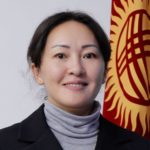 Lira Samykbaeva
Lira Samykbaeva
Ms Lira Samykbaeva, as the Deputy Minister of Education and Science of the Kyrgyz Republic
for Digitalization, oversees initiatives focused on integrating technology into education to
enhance learning outcomes and improve administrative processes. Her expertise lies in
leveraging technology to create innovative and inclusive solutions that address the evolving
needs of the education sector. She’s committed to driving digital innovation in education and
continues to champion initiatives that pave the way for a more digitally inclusive and accessible
education system.
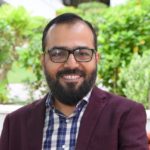 Sajid Ali
Sajid Ali
Dr Sajid Ali is Amir Sultan Chinoy endowed Professor and Director Research at the Aga Khan University’s Institute for Educational Development, Pakistan. He holds a PhD in Education Policy from the University of Edinburgh, an MEd in Leadership and Policy from Monash University, and a Masters in Sociology from the University of Karachi. He is the General Secretary of Pakistan Association for Research in Education (PARE). Dr Ali is a key member of various policy forums at national and provincial levels. He has contributed to the formation of various government policies: National Education Policy 2009; Sindh Education Sector Plan; Public Private Partnership Act, Non-Formal Education Policy of Sindh 2018, National Education Policy Framework 2024 etc. Most recently, Dr. Ali has played a lead role in formulating the Teaching License Policy Sindh 2023 and presented it to the Sindh Cabinet for approval. Currently he is leading a research project on public private partnerships and also contributing to Data and Research in Education Research Consortium (DARE-RC) as Co-Lead. He is the Pakistan Country Coordinator for Global Partnership for Education – Knowledge and Innovation Exchange (GPE-KIX).
 Sung Jae Park
Sung Jae Park
Dr Sung Jae Park is a senior research fellow and director-general at the Korean Educational Development Institute (KEDI). He served as a senior advisor to the Deputy Prime Minister and Minister of Education of the Republic of Korea.
 Syeed Ahamed
Syeed Ahamed
Syeed Ahamed is a public policy analyst and the founding CEO of the Institute of Informatics and Development (IID) in Dhaka, Bangladesh. Since 2013, he has led IID’s mission to foster an informed, inclusive, and democratic society through research, advocacy, and public engagement. He previously served as a Research Fellow at the University of Melbourne, Australia. Syeed also coordinates the Bangladesh CSO Alliance Secretariat and holds several international and national advisory roles, including Steering Group Member of UNESCO Bangkok’s NEQMAP, Member of the Bangladesh Ministry of Education’s GPE-KIX National Steering Committee, Country Focal for the PAL Network, and Team Lead of the GPE-EOL-funded e!quality education project. His innovative contributions to research communication, capacity building, and policy advocacy have earned him multiple distinctions, including the Manthan Award, the mBillionth Award, and the National ICT Award. His research interests centre on educational justice, the assessment of foundational learning, and advancing gender equality and social inclusion in education policy and practice.
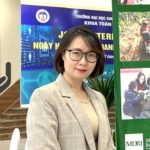 Thi Ly Le
Thi Ly Le
Thi Ly Le is Head of Institutions, Infrastructure, Economics and Business at the Mekong Development Research Institute (MDRI) in Hanoi and a lecturer at the University of Languages and International Studies, Vietnam National University, Hanoi. She holds a PhD in International Relations from the University of Nottingham (UK) and has five years of experience leading education research and evaluations in Vietnam and Asia. Her work has focused on learning loss and recovery, education system resilience, school management, and gender equality in education, with large-scale projects for the World Bank, ADBI, DFAT, and IDRC. She specialises in producing and communicating mixed-method evidence to inform government decision-making and collaborates closely with ministries, international organisations, and local stakeholders to strengthen the use of research in education policy and planning.
Eligibility
Anyone is eligible to participate. The webinar is particularly aimed at policy makers, education stakeholders, officials, teachers and academic researchers. To access the webinar, you need to register in advance. Please spread the news about this event to your colleagues and networks, and on social media: @KIXEMAP, @NORRAG, @UNESCO and @Education2030UN.

